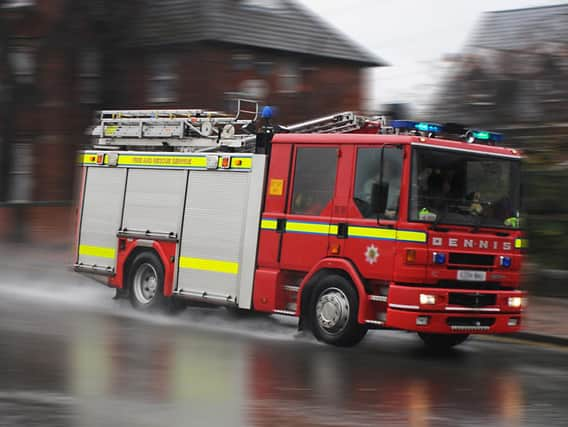Union calls for extra urgent recruitment of extra firefighters in Yorkshire after 'decade of devastating cuts'


Bosses at the FBU have revealed West Yorkshire Fire and Rescue Service has lost 603 firefighters since 2010, a cut of 35 per cent, with South Yorkshire Fire and Rescue Service losing 293 over that time, a reduction of 31 per cent.
Humberside and North Yorkshire services have also been cut by 21 per cent and 11 per cent respectively according to the research which showed across the UK, there are now than 11,200 fewer firefighters than there were a decade ago.
Advertisement
Hide AdAdvertisement
Hide AdThe figures have been released today as the FBU launches a UK-wide campaign calling for urgent investment in frontline staffing.
The combined threats of climate change-related events such as flooding and wildfires, pandemics, terrorism, and the post-Grenfell Tower building safety crisis will require the immediate funding for at least 5,000 firefighters nationally in the next year, the FBU predicted.
The staffing shortage has caused many fire and rescue services to send out fire engines with just three firefighters on board, fewer than the minimum five required to safely perform a rescue or tackle a fire, the union claimed.
Matt Wrack, FBU general secretary, said: "Be it mass flooding and wildfires caused by climate change, huge post-Grenfell building safety challenges, terrorist attacks or pandemics, firefighters are an all-hazards emergency service on the frontline protecting the UK from the vast majority of major threats.
Advertisement
Hide AdAdvertisement
Hide Ad"But a decade of devastating cuts means that we can only effectively handle one of these crises at a time. The brutal reality is that if and when mass-flooding or another major emergency hits this winter, it could impact firefighters' ability to aid the pandemic response, or respond to another major incident.
"Increasingly, each time one of these major emergencies break out, the public face a roll of the dice, hoping that more than one won't come at once - and it's only a matter of time until we lose that gamble.
"We need at least 5,000 new firefighters immediately to repair some of the damage austerity has done to our service and prepare for the risks of today and tomorrow."
The union said, despite the cuts to West Yorkshire firefighter numbers, crews in the Calder Valley have seen six major floods hit in the past five years and elsewhere firefighters have tackled persistent wildfires including a 3,700-acre wildfire on Marsden Moor last year.
Advertisement
Hide AdAdvertisement
Hide AdUnion bosses said Leeds, the biggest city in the county, also currently has 13 buildings deemed unsafe due to major fire safety defects.
West Yorkshire Fire and Rescue Service Chief Fire Officer John Roberts said: “Funding to the Fire Service has decreased significantly since 2010 not just in West Yorkshire but across the entire country. As a result the number of firefighters and support staff have reduced in line with this.
“However, our priority remains to keep firefighters and the people of West Yorkshire safe and we have focused huge efforts on thoroughly risk assessing the area so we can provide the best fire cover possible – with stations and firefighters best placed to respond to emergencies as quickly as possible.
“We have devised innovative ways of working to ensure that we are being as effective and efficient as possible in our use of resources and we continue to provide a first class fire and rescue service.”
Advertisement
Hide AdAdvertisement
Hide AdIn South Yorkshire, the FBU pointed out the region faced some of the worst flooding in UK history last summer as well as a major 10-day long wildfire in Hatfields Moors.
A South Yorkshire Fire Service spokeswoman said: “We've suffered big cuts to our Government funding over the last 10 years.
“Given most of our money is spent on staff, this has inevitably affected firefighter numbers.
"However, we are continuing to provide a first class service to local people and have plans to recruit dozens of new firefighters in the coming months."
Advertisement
Hide AdAdvertisement
Hide AdDuring the first wave of the Covid-19 pandemic, firefighters took on 14 new activities to respond to, according to the FBU, including moving dead bodies, driving ambulances and delivering Personal Protective Equipment (PPE).
The FBU’s #FundTheFrontline campaign encourages members of the public and firefighters to write to their MPs to demand urgent investment in the Government’s one-year spending review.
A Home Office spokesperson said: “Firefighters work tirelessly every day to protect our communities and have gone above and beyond during the pandemic to keep people safe.
“Fire and Rescue Services have the resources they need – they will receive around £2.3 billion in 2020/21. There has been a downward trend in fires since 2009, with the number of incidents in England falling by more than a third in the past decade.”
Comment Guidelines
National World encourages reader discussion on our stories. User feedback, insights and back-and-forth exchanges add a rich layer of context to reporting. Please review our Community Guidelines before commenting.